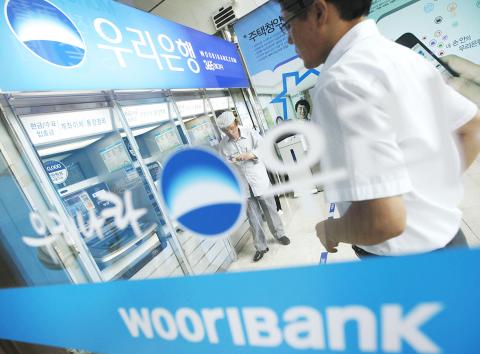South Korea’s anti-trust watchdog yesterday launched a probe into major local banks suspected of colluding to fix interest rates of certificates of deposit (CD), bank officials said.
The probe comes after news in Britain that Barclays and, allegedly, other banks manipulated the London interbank offered rate in an attempt to mask their financial problems, and in some cases to profit.
The Fair Trade Commission sent investigators to the headquarters of Kookmin, Woori, Shinhan and Hana banks, a day after it launched a probe into brokerage firms, bank officials said. Brokerages, which report CD rates twice a day, are suspected of colluding to fix rates on 91-day certificates.

Photo: Reuters
A CD is a way of saving with a specified fixed interest rate and maturity sold by banks and circulated in the secondary market by brokerages. The three-month CD rate is used as a benchmark in setting lending rates for financial products.
CD rates remained relatively higher than other market rates, although the Bank of Korea unexpectedly cut its policy rate to 3 percent last week.
Banks benefit from high CD rates as a bulk of household loans are tied to them.
Financial officials say household debts, which stood at 857 trillion won (US$752 billion) at the end of March, pose a downside risk to the economy amid a global economic slowdown and a sluggish domestic property market.
Many South Korean households rely on debts to buy a house and pay only the interest every month, paying back the principal when they sell the house. However, a weak property market often means they cannot make enough to pay back the principal when the loan is due.
Moody’s Investors Service said last month household loans have grown “at an alarming rate” and are vulnerable to financial shocks arising from the global economic downturn. More people are borrowing just to meet living expenses and there is an increase in borrowers from the older age group and lower income group, it said.

GROWING OWINGS: While Luxembourg and China swapped the top three spots, the US continued to be the largest exposure for Taiwan for the 41st consecutive quarter The US remained the largest debtor nation to Taiwan’s banking sector for the 41st consecutive quarter at the end of September, after local banks’ exposure to the US market rose more than 2 percent from three months earlier, the central bank said. Exposure to the US increased to US$198.896 billion, up US$4.026 billion, or 2.07 percent, from US$194.87 billion in the previous quarter, data released by the central bank showed on Friday. Of the increase, about US$1.4 billion came from banks’ investments in securitized products and interbank loans in the US, while another US$2.6 billion stemmed from trust assets, including mutual funds,

Micron Memory Taiwan Co (台灣美光), a subsidiary of US memorychip maker Micron Technology Inc, has been granted a NT$4.7 billion (US$149.5 million) subsidy under the Ministry of Economic Affairs A+ Corporate Innovation and R&D Enhancement program, the ministry said yesterday. The US memorychip maker’s program aims to back the development of high-performance and high-bandwidth memory chips with a total budget of NT$11.75 billion, the ministry said. Aside from the government funding, Micron is to inject the remaining investment of NT$7.06 billion as the company applied to participate the government’s Global Innovation Partnership Program to deepen technology cooperation, a ministry official told the

Taiwan Semiconductor Manufacturing Co (TSMC, 台積電), the world’s leading advanced chipmaker, officially began volume production of its 2-nanometer chips in the fourth quarter of this year, according to a recent update on the company’s Web site. The low-key announcement confirms that TSMC, the go-to chipmaker for artificial intelligence (AI) hardware providers Nvidia Corp and iPhone maker Apple Inc, met its original roadmap for the next-generation technology. Production is currently centered at Fab 22 in Kaohsiung, utilizing the company’s first-generation nanosheet transistor technology. The new architecture achieves “full-node strides in performance and power consumption,” TSMC said. The company described the 2nm process as

Even as the US is embarked on a bitter rivalry with China over the deployment of artificial intelligence (AI), Chinese technology is quietly making inroads into the US market. Despite considerable geopolitical tensions, Chinese open-source AI models are winning over a growing number of programmers and companies in the US. These are different from the closed generative AI models that have become household names — ChatGPT-maker OpenAI or Google’s Gemini — whose inner workings are fiercely protected. In contrast, “open” models offered by many Chinese rivals, from Alibaba (阿里巴巴) to DeepSeek (深度求索), allow programmers to customize parts of the software to suit their